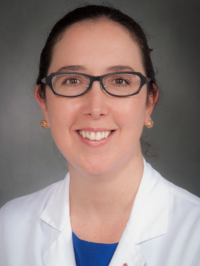Dedicated Breast Cancer Surgeon Also Serving as Vice Chair of Equity, Diversity, and Inclusion
After nearly 10 years as a breast cancer surgeon in University of Utah Health’s Department of Surgery, Cindy Matsen, MD, is now serving in the additional role of Vice Chair of Equity, Diversity, and Inclusion.

Matsen took on the new position in August 2023. In her new role, she will help guide EDI efforts in the department while continuing her work as a surgeon, where she plays a pivotal role in cancer treatment at Huntsman Cancer Institute.
Prior to this role, she has served on various national ethics committees, including the American Society of Breast Surgeons, and the Alliance for Clinical Trials in Oncology. Matsen is also an experienced researcher with a special focus on communication research – a skill that has uniquely prepared her for her new role.
Through her research and work as a surgeon focused on treating a complex women’s health issue, Matsen has gained a deep understanding of the intricacies of human relationships. She noted how people’s perceptions of themselves, or another person can impact how people engage with one another.
“We all internally may feel one way and the world sees us another and vice versa,” Matsen explained. “We assign expectations based on those perceptions without necessarily knowing the whole story. We need to be conscious of the individual relationships we have with our patients and our own experiences, so we can figure out how to align our goals and values better.”
Matsen’s own personal journey has contributed to her awareness and interest in others, guiding her research passions as well. Despite a successful career, she admits to dealing with her own insecurities and expectations, so she is sensitive and keenly aware of how this may impact others.
“Being a good doctor and providing quality care to patients isn’t based on systemic biases, but those biases are still there,” Matsen noted. “Everyone is different. Whether you're the one providing healthcare or receiving it, we're all human. So, it's important to acknowledge the biases that exist and find solutions so everyone can feel valued.”
Matsen believes that understanding individuals’ experiences, perceptions, and culture can help improve the way medical professionals treat existing patients while also helping more people receive care.
As she settles into her new role, Matsen is focused on increasing awareness of EDI resources, services, and opportunities – for both the department and community at large.
“I want to strengthen our belonging and inclusion efforts, and an important part of that is making sure people know what’s available to them,” Matsen said. “We have so many different programs and opportunities surrounding EDI. I want to help people take advantage of them.”
Matsen also plans to research and work toward implementing new departmental practices. She hopes to expand capacity to serve a broadly diverse population.
“I would really like to expand our Spanish language services, especially in areas like breast cancer care, and find new ways to improve how we serve diverse groups,” Dr. Matsen said. “For example, we have a lot of rural patients, and they have different needs than patients who live near the hospitals and clinics. So, looking at how we're caring for each individual patient and how we can overcome potential obstacles is important.”
In her work as a physician and vice chair, Matsen hopes she can help build a culture that is inclusive and equitable for all staff and patients.
“I know this work isn’t easy or comfortable, but I want to keep learning and finding ways to expand my own personal perspectives,” Matsen said. “It will take time and we won't always get it right. But the times we do get it right accumulate, and that's how you create a new culture.”